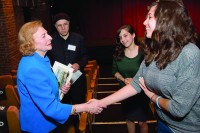Survivor, Documentary Bring Horrors of Holocaust into Focus

When Ruth Bachner was a young girl growing up in 1930s Vienna, her parents became fearful as stories began trickling out of Germany that fellow Jews were being persecuted.
Although they were still safe, her father, a haberdashery shop owner, gave the family cause for concern.
“If this happens in Berlin today, tomorrow it could happen in Vienna,” she remembered her father warning.
Her father’s prophetic words came true on the night of Nov. 10, 1938, when synagogues and thousands of Jewish businesses throughout Europe, including Vienna, were destroyed on Kristallnacht, the night of broken glass. It was her earliest personal memory of the terror that would engulf most of Europe and millions of Jews for most of the next seven years.
“They brought the people out into the street and made them wash the street, just to demean them,” recalled Bachner, a Somers resident.
Bachner spoke at the Jacob Burns Film Center in Pleasantville in a theater filled with high school students and dignitaries last Thursday, April 19, on Yom HaShoah, Holocaust Remembrance Day. Her talk followed a screening of “Irena Sendler: In the Name of Their Mothers,” an hour-long documentary that told the story of Sendler, a 29-year-old Polish Catholic social worker who organized elaborate schemes to hide and save Jewish children. With a network of assistants, Sendler created phony papers to change the children’s identity and have them spend the rest of the war in convents and Christian schools and with non-Jewish families.
Bachner’s story was strikingly similar. Her parents entrusted her to a priest, Father Bruno Reynders, who placed Bachner in convent in Belgium. Her family fled their home following the outbreak of war, determined to reach relatives and eventually gain passage to the United States. On the day they were supposed to leave for America, the Germans invaded Belgium and they were forced to flee.
Last week’s program, co-sponsored by the Westchester Jewish Council and the Holocaust and Human Rights Education Center, hosted students from four high schools–Pleasantville, New Rochelle, Westchester Hebrew High School and Solomon Schechter. The focus wasn’t only on the Holocaust but how everyone can fight prejudice.
Pleasantville Community Synagogue Rabbi Mark Sameth urged the students not to shirk responsibilities from helping to stop abuses, whether it’s in their school or in the larger community.
“Genocide can happen to anyone,” Sameth said. “It happened to the Armenians in Turkey, it happened to the gypsies in Rwanda, it happened in Bosnia, to Muslims in Yugoslavia. It can happen to anyone, anywhere and so we all have to be very careful not to allow any group of people to be the target of hatred and for all to do our part.”
Virginia Mancini, who teaches AP European History at Pleasantville High School, jumped at the chance to bring her 47 students to the event. After 21 years teaching the class, she said the challenge has been to continue to make the Holocaust relevant to a new generation that doesn’t have as much contact with survivors or feel as connected to what happened. more than 70 years ago.
“Over time, because we’ve moved farther away from it, you have to bring it much more into focus and then we’d like to make it about other human rights issues,” Mancini said.
Following her talk, Bachner, who was reunited with her family following the war, said it took decades for her brother to reconcile being sent to a Catholic orphanage. Bachner initially wanted to become a nun following the war but was slowly integrated back into her former life.
For decades, she held a deep-seeded hatred toward Germans since World War II. It wasn’t until Bachner spoke earlier this year at the German School in White Plains where she had a chance to talk with parents and realized that she could no longer shun people because of their background, especially when they’re trying to teach their children well.
“It’s been many, many years and I always felt that kind of hatred. Suddenly it just disappeared,” Bachner said. “That’s one good thing–you can’t hate all your life.”

Martin has more than 30 years experience covering local news in Westchester and Putnam counties, including a frequent focus on zoning and planning issues. He has been editor-in-chief of The Examiner since its inception in 2007. Read more from Martin’s editor-author bio here. Read Martin’s archived work here: https://www.theexaminernews.com/author/martin-wilbur2007/
